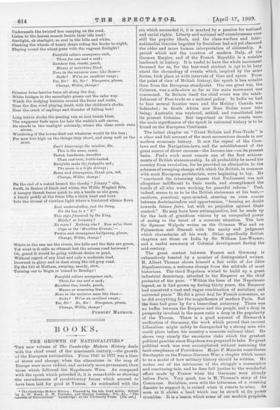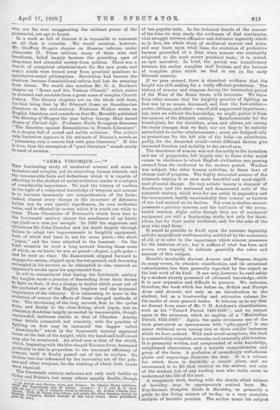BOOKS.
THE GROWTH OF NATIONALITIES.*
-True new volume of The Cambridge Modern History deals with the 'chief event of the nineteenth .Century,—the growth of the European nationalities. From l84 to 1871. was a time of stress and change, when the alterations in the map of Europe were more radical, and certainly more permanent, than
• those which follewed the Napoleonic Wars. As compared with the epoch which preceded it, it is remarkable as allowing • the recrudescence of revolutionary forces which seemed to have been laid for good at Vienna. As contrasted with the
" The Cambridge Modern Itislory. Planned by the late Lord Aden. Edited by A. W. Ward, G. W. Prather°, and • Staeley Leathes. Vol. XT.,. "The .uninth of Nationalities." Cambridge': at the University Prose. [16s. net.] era which succeeded it, it is marked by a passion for national and racial rights. Liberty and national self-consciousness were still the popular ideals, and the class-warfare and inter- nationalist theories begotten by Socialism had not yet obscured the' older and more human interpretation of citizenship. A Period which ea* the creation of modern Italy, of the German Empire, and of the .French Republic is .a notable landmark in history. It is useful to have the whole movement focussed for us, for the best-read student is apt to be hazy about the chronology of events which, inspired by the same forces, took place at wide intervals of time and space. From the point of view of British history, the epoch is less notable than from the European standpoint. Our one great war, the Crimean, was a side-show so far an the main movement was concerned. In Britain itself the chief event was the estab- lishment of Free-trade as a national policy. In India we had
to face several frontier were and the ; Canada was federated; in South Africa, new Boer States came into being; Australia was explored, settled, and constituted into its present Colonies. But important as these events were. the main significance of the epoch in universal history is to be found on the European Continent.
The initial chapter on "Great Britain and Free-Trade" is a clear and full account of the most momentous decade in our modern economic history. It saw the repeal of the Corn- laws and the Navigation-laws, and the establishment of the great source of direct revenue—the Income-tax—on its present basis. Peel's work must remain one of the first achieve- ments of British statesmanship. In all probability he saved his country from revolution, for he provided an alternative to the schemes of sweeping change with which the British, in common with most European proletariats, were beginning to toy. He " convinced the labouring classes that Parliament was not altogether indifferent to their needs, and strengthened the hands of all who were working for peaceful reform." Peel, indeed, seems to us to be the British statesman at his best,— cautious, practical, open-minded, steering an oven course between doctrinairedom and opportunism, "leaning no doubt towards laissez faire, but with no prejudice against State control." He may have been unimaginative, but he made up for the lack of grandiose visions by an unequalled power of seeing to the heart of a concrete situation. The late Sir Spencer Walpole writes on the Crimean War and on Palmerston and Disraeli with the sanity and judgment which characterise all his work. Other specifically British chapters are those on India by Sir William Lee-Warner, and a useful summary of Colonial development during the mid-century.
The great contest between France and Germany is exhaustively treated by a number of distinguished writers. M. Albert Thomas shows himself a fair critic of Les Rees Napolooniennes, a welcome change from the attitude of most historians. The third Napoleon wished to build up a great industrial democracy, attached to the Emperor as the chief protector of the poor. "Within the lines of the Napoleonic' legend, as it had grown up during thirty years, the Emperor had conceived a vast and vague combination of socialism and universal peace." He did a great deal for French commerce, as he did everything for the magnificence of 'modern Paris. But the time had gone by for a benevolent autocracy. There was no buffer between the Emperor and the people, and a drop in prosperity involved in the Flame ratio a drop in the popularity of the Throne. There is a good account* of Bismarck's unification of Germany, the work which proved that current Liberalism might safely be disregarded by a strong man who could place before his country a concrete national ideal. He shows very clearly the enormous risks which the greatest political gambler since Napoleon was prepared to take. No great political work was over accomplished without assuming the tacit compliance of Providence. Major F. Maurice contributes the chapter on the Franco-German War, a chapter which seems to us a model of how military history should be written. He makes out of the intricacies of the struggle a consecutive and convincing tale, and he does full justice to the wOndeaul effort made by France when the Germans were already before Paris. Very good, too, is M. Thomas's story of the Commune. Socialism, even with the bitterness of a crushing disaster to support it, is ruined when it resorts to arms. As soon as it shows a• head which can be struck at its power crumbles. It is a lesson which some of our modern prophets,
who are for ever exaggerating the militant power of the Proletariat, are apt to forget.
In a work so full of interest it is impossible to comment on all that is valuable. We wOuld mention, however, Mr. Geoffrey Drage's chapter on Russian reforms under Alexander II. These reforms, many of them wise and beneficent, failed largely because the preceding ages of despotism had alienated society from politics. There was a dearth of competent administrators for the new posts, and men's minds were turned away from practical questions to speculative social philosophies. Revolution had become the nostrum, because Constitutional reform had lost its meaning from disuse. We would also mention Mr. G. A. Fawkee's chapter on "Rome and the Vatican Cduncil," which states in succinct and readable form a great mass of complex Church history. The literary chapters are on the whole well done, the best being that by Mr. Edmund Goose on Scandinavian literature in the mid-century. Professor Walker writes on English literature, and reminds us that Mr. Meredith published The Shaving of Shagpat the year before George Eliot issued Scenes of Clerical Life, Professor Emile Bourgeois discusses "The Reaction against Romanticism in French Literature" iu a chapter full of sound and subtle criticism. The critic's only limitation appears in his estimate of Dumas'a novels as "Possessing only a remote link with pure literature." If this is true, then the conception of "pure literature" stands sorely in need of revision.







































 Previous page
Previous page